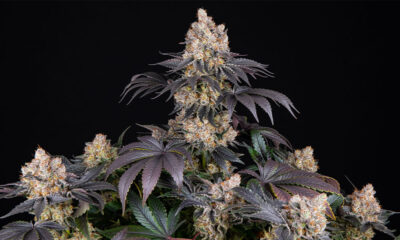
Strains
Patented Pot: What Is a Proprietary Marijuana Strain?
Canadian marijuana companies are busy acquiring strain banks—which doesn’t really mean much, yet.
As the crowds shouldering and elbowing for position at the cup winners booth at any given local cannabis expo demonstrate, marijuana genetics are a very big deal.
Seed-heads can tell you all about why this pack is really worth $1,000 or why these seeds from this hype strain are bunk or why it doesn’t matter what genetics you have if you don’t know how to grow it. With the right marketing, a good strain can even make a marijuana empire — for proof, take a peek at what Cookies is up to now.
But that’s also very Cannabis 1.0. What matters right now for any publicly traded marijuana company are proprietary strains and acquiring a bank of exclusive strains, as several firms have done over the past few months.
Or so they claim.
Pink Sheet Players Fall in Line
In November, an outfit called International Cannabis Corporation, which was trading on the penny-stock “pink sheets” at 0.27 a share at end of business on Tuesday, announced that it had bought out the 120-strain portfolio of a seed bank called Green Gene Genetics.
This was followed a little more than a month later by the news from Agraflora Organics, a Vancouver, BC-based firm that has an ownership stake in at least one Canadian licensed producer. The firm announced it had bought out a “large library of cannabis seed varieties” from a genetics firm called Vendure Genetics Labs, who will sometime this year roll out “184 new varieties” — all of which will be exclusively produced and marketed by Agraflora.
If you’re asking yourself, “who the hell are these companies?” don’t feel ashamed. They are not exactly prominent players in the marijuana world. Both Agraflora and International Cannabis Corp. operate on what you could accommodatingly call the margins of the legal cannabis world: the pink sheets, where companies can make any claim they please without raising attention from pesky regulators like the Securities and Exchange Commission.
Web searches for “Green Gene Genetics” turn up not much aside from press releases touting ICC’s acquisition of the firm, and there isn’t much of a presence of “Vendure Genetics Labs” aside from news of its deal with Agraflora.
In a way, both companies are aping earlier announcements from Canopy Growth Corporation, sometimes touted as the cannabis industry’s first unicorn, which in late 2016 announced to the world (and investors) that it was working on proprietary genetics.
Proprietary Pot in the Present
There are two ways to look at this trend. One is that some marginal players picked up companies nobody has heard of in an attempt to bolster their image for would-be investors, perhaps in an attempt to follow the winning blueprint left by an industry leader.
Another is that, eventually, there will be bidding wars for marijuana genetics by major publicly traded companies. But in order for that to happen, and in order for it to matter beyond the depths of stock-traders’ message boards, a few more things need to go down first.
There’s a reason why growers buy seeds rather than trying to reverse-engineer their competition’s hype strain: breeding is a pain in the butt. It takes a long time, a lot of effort, and a willingness to fail and to reassess before trying again. Not every investor has that kind of patience. Thus, there is a market for stable and solid genetics as a shortcut to an impressive “portfolio” of strains — good news if you are a cannabis company trying to stand out from an increasingly crowded field.
But in order for any kind of property to be truly “proprietary,” it must have an owner. And ownership can be decided in only so many ways, such as with a registered trademark or patent, which then must be defended in court. In order to patent a marijuana strain, you have to have a good idea of what exactly you are patenting, which means you need to know the strain’s genetic makeup.
There are companies working in this arena, but the science is still ahead of law and business. So basically, even if you have a pretty good idea of what your strain is, whether you can actually call it yours and prevent anyone else from growing it and thereby create a market for your strain beyond the seed bros, remains to be seen.
This is not to say it won’t happen. It will. Someday. And this is not to say companies don’t have unique strains all their own. They surely do — but for now, their competitors might, too, and there really isn’t much they can do about it aside from gripe on Instagram.
TELL US, does knowing that a strain is rare make you more likely to purchase it?


























